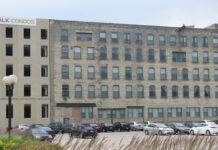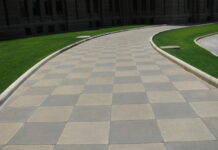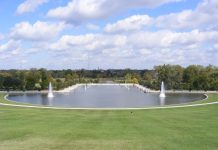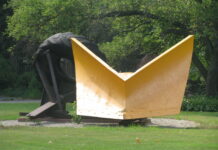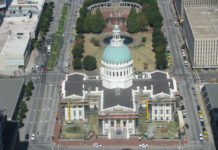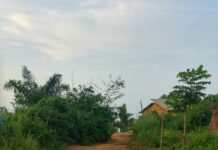Photo credit: DiasporaEngager (www.DiasporaEngager.com).
by MARTIN VAN STADEN
JOHANNESBURG, (CAJ News) – THE results are in. The African National Congress has attained 39% of the vote, the Democratic Alliance (DA) 21%, uMkhonto we Sizwe (MK) 14%, and the Economic Freedom Fighters (EFF) 9%.
It is clear that some of these parties enjoy too much support in the context of a country that claims to be a constitutional state that prioritises the rule of law and which requires massive foreign and domestic private investment.
Investment, and by implication economic growth, is impossible in the absence of the certainty and stability that the rule of law offers. Indeed, you will find no example of a thoroughly successful society anywhere in the world that does not rank highly in both measurements of economic freedom and the rule of law.
Measuring success
The golden standards in both departments are the Economic Freedom of the World (EFW) annual report by the Fraser Institute, and the Rule of Law Index (RLI) by the World Justice Project. The 15 highest ranked countries in the RLI, meaning the countries that best respect the rule of law, are all in the first quartile of the EFW.
South Africa ranks 94th out of 165 in the EFW and 56th out of 142 in the RLI. In both cases, broadly in the middle of the pack.
A society can only experience growth and progress under circumstances where the rule of law and a dynamic market economy are maintained. I challenge anyone to find an example of a country that has decided to pursue (real, capitalist) freedom of enterprise and a strict adherence to the rule of law, which has not been successful.
No matter how loudly the radical left in South Africa proclaims the ANC’s ‘great betrayal’ of adopting so-called ‘neoliberal’ policies over the three decades of its rule, the data simply does not reflect that. The ANC has been a committed interventionist party that does not tolerate a free private sector.
Neither of the two other notable radical left parties, the (terribly misnamed) EFF and MK, would do any better.
Defining the rule of law
Leaving economic freedom aside, South Africa has always fared relatively well on the rule of law charts compared to the rest of the African continent. However, unfortunately like most of the rest of the world, South Africa’s rank is slipping. In the 2023 RLI, South Africa was beaten on the continent by (in ascending order) Botswana, Mauritius, Namibia, and, taking the top African spot, Rwanda.
At a recent gathering in Vaduz, Liechtenstein, where I presented my paper, ‘Rule of Law: The Universal Unwritten Constitution,’ I defined the rule of law as the legal institution that regulates or attempts to eliminate state arbitrariness.
To be practically useful, the RLI purposefully adopts a wider conception of the rule of law than this, by measuring a large number of rule of law-related factors. However, it has adopted four ‘universal principles’ of the rule of law which all, in some form or another, are explored in my paper. They are:
- Public and private accountability to law;
- Clear, publicised, stable, and evenly applied law;
- Accessible, fair, and efficient processes through which the law is adopted, enforced, and adjudicated; and
- Impartial, independent, and competent administration of justice.
The dangers of democracy
In large part, high degrees of economic freedom and the rule of law tend to coincide with democratic dispensations. But this does not mean democracy is not itself an unruly mechanism.
Venezuela is an excellent example. This South American country finds itself dead-last on both the Economic Freedom of the World and the Rule of Law Index. It does not get any worse for free enterprise or constitutionalism than Venezuela.
This is a country that in the middle of the previous century was one of the five wealthiest societies in the world. According to the Policy Circle, Venezuelans are today poorer than they were in the 1920s. This contrasts starkly with virtually anywhere else in the world, including Africa, where people are leagues better off today than they were back then.
What happened?
After some economic woes in the 1980s and an attempt to implement necessary austerity measures, the socialist populist Hugo Chávez was elected President of Venezuela in 1998. Two years later, in 2000, his United Socialist Party also swept up the seats in parliament.
Venezuelans had opted to welcome socialism into the halls of political power via democratic means.
Chávez and his successor, Nicolás Maduro, followed the socialist playbook diligently, nationalising industries, alienating foreign capital, and implementing significant regulatory controls throughout the length and breadth of the economy. Not to be undermined by the evil forces of capitalism again, they have taken steps to dismantle democracy itself and for some time now have even been on a war-footing with neighbouring Guyana.
About six million Venezuelans have fled their country into neighbouring states, primarily Colombia. Those who remain live in the midst of a humanitarian crisis, with widespread malnutrition and economic woes too numerous to list.
Venezuela is a supercharged version of Zimbabwe, with South Africa fulfilling a similar role for Zimbabwe as Colombia does for Venezuela.
South Africa’s immature democracy
Many people naïvely believe that one ‘cannot vote wrong’ during an election. After all, in a democracy, all one needs to do is ‘vote one’s conscience.’ This is the civic duty that each citizen is said to possess.
This is a dangerous misapprehension that the Venezuelan example disproves. Ruin entered Venezuela through the door of democracy, and this tragic story is by no means the only example of democracy being used to herald collapse in the world.
If we accept that one has a responsibility – a duty – to engage in the democratic process, then we must accept that one must do so responsibly. This, by implication, means that it is possible to do so irresponsibly.
One can, in fact, vote wrong.
Democracy and voting alone are easy enough phenomena to institutionalise. When it is said that democracy is difficult, what is in fact meant is that it is difficult to elevate a society’s political culture to the point where that society does not utilise democracy to destroy itself or destroy the rule of law.
The Venezuelans have had to take their medicine, heartbreaking as it might be. And South Africa’s democracy, threateningly, remains immature.
The fact that parties like the EFF and MK, who regard Venezuela as a success story rather than a cautionary tale, secured as many votes as they did, is conclusive proof of this. Both of these parties – and others now represented in Parliament – are anti-democratic and anti-constitutionalist. They say so themselves, openly.
A warning
The infrastructure of State Capture still exists on our statute book. Cyril Ramaphosa, if anything, has only outlawed the rhetoric of corruption, not its widespread practice. The same legislation and regulations that enabled the widespread looting of the fiscus and abuse of state power remain in force.
The 2014 Legal Practice Act ended the independence of the advocates profession and made it entirely subservient to a state-appointed Legal Practice Council (LPC), which ultimately answers to the Minister of Justice. This body can determine what is and what is not allowable or ‘ethical’ conduct for lawyers.
Lawyers are forced to give their time – gratis – to what is called ‘community service,’ which would include rendering services to the poor and vulnerable, but also to the state. Though such pro bono requirements are seen elsewhere in the world, in South Africa the LPC has issued guidelines that allow lawyers to spend their pro bono time freely on government causes, but whenever they wish to render a community service that is not related to the state, the LPC must first approve that cause. A lawyer must, therefore, give their time, freely, to causes that serve the state’s interests.
Nothing stops a new government from installing an LPC that is far more explicit and brazen in its control over the legal profession, and by extension, the vindication of South Africans’ constitutional rights and the protection of our constitutional institutions.
The courts, for now, remain somewhat independent, but already it has become clear that many judges are far too willing to give effect to the state’s ideological imperatives to ensure that they are elevated to more senior positions. The state’s Judicial Service Commission, consisting primarily of politicians from the ruling bloc, will not, after all, elevate judges who are seen to be obstacles to ‘transformation.’
Transformation(ism)
And it is this pernicious word – ‘transformation’ – that all the radical, anti-democratic, anti-constitutional formations of South African society have weaponised as a be-all and end-all justification for overzealous state action.
Private property is to be confiscated without compensation in the name of transformation (the Expropriation Bill). Private medical aids are to be abolished in the name of transformation (the National Health Insurance Act). Freedom of expression is to be curtailed in the name of transformation (the Hate Speech Act).
Virtually anything autocratic can be justified in this manner, and when it is so justified, South African judges are hesitant to be seen as hindrances that stand in the way of ‘transformation.’
And so, private domestic and international capital slowly, but surely, begin to look elsewhere.
What happened in Venezuela can happen in South Africa. It is not only dictatorship and autocracy that can destroy the rule of law, economic prosperity, and social progress. Democracy, too, can herald ruin, if voting is not done responsibly.
Up to now, the electorate has democratically allowed the ANC to wreak havoc in the name of transformation. With the results of 29 May now in, it is clear that there remains some appetite for ruin, and that real political maturity has not yet manifested itself.
NB: Martin van Staden LL.M. (UP) is Head of Policy at the Free Market Foundation.
– CAJ News
Source of original article: News – CAJ News Africa (www.cajnewsafrica.com).
The content of this article does not necessarily reflect the views or opinion of Global Diaspora News (www.GlobalDiasporaNews.com).
To submit your press release: (https://www.GlobalDiasporaNews.com/pr).
To advertise on Global Diaspora News: (www.GlobalDiasporaNews.com/ads).
Sign up to Global Diaspora News newsletter (https://www.GlobalDiasporaNews.com/newsletter/) to start receiving updates and opportunities directly in your email inbox for free.




